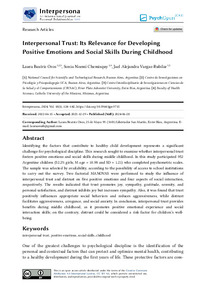Please use this identifier to cite or link to this item:
https://repositorio.uca.edu.ar/handle/123456789/19168| DC Field | Value | Language |
|---|---|---|
| dc.contributor.author | Oros, Laura Beatriz | es |
| dc.contributor.author | Chemisquy, Sonia Noemí | es |
| dc.contributor.author | Vargas Rubilar, Jael Alejandra | es |
| dc.date.accessioned | 2024-12-05T11:30:29Z | - |
| dc.date.available | 2024-12-05T11:30:29Z | - |
| dc.date.issued | 2024 | - |
| dc.identifier.issn | 1981-6472 (online) | - |
| dc.identifier.uri | https://repositorio.uca.edu.ar/handle/123456789/19168 | - |
| dc.description.abstract | Identifying the factors that contribute to healthy child development represents a significant challenge for psychological discipline. This research sought to examine whether interpersonal trust fosters positive emotions and social skills during middle childhood. In this study participated 952 Argentine children (52.2% girls; M age = 10.98 and SD = 1.21) who completed psychometric scales. The sample was selected by availability, according to the possibility of access to school institutions to carry out the survey. Two factorial MANOVAS were performed to study the influence of interpersonal trust and distrust on five positive emotions and four aspects of social interaction, respectively. The results indicated that trust promotes joy, sympathy, gratitude, serenity, and personal satisfaction, and distrust inhibits joy but increases sympathy. Also, it was found that trust positively influences appropriate social behaviors and reduces aggressiveness, while distrust facilitates aggressiveness, arrogance, and social anxiety. In conclusion, interpersonal trust provides benefits during middle childhood, as it promotes positive emotional experience and social interaction skills; on the contrary, distrust could be considered a risk factor for children’s wellbeing. | es |
| dc.format | application/pdf | es |
| dc.language.iso | eng | es |
| dc.publisher | PsychOpen | es |
| dc.rights | Atribución 4.0 Internacional | * |
| dc.rights.uri | http://creativecommons.org/licenses/by/4.0/ | * |
| dc.source | Interpersona An International Journal on Personal Relationships. 2024, 18 (1) | es |
| dc.subject | CONFIANZA INTERPERSONAL | es |
| dc.subject | EMOCIONES POSITIVAS | es |
| dc.subject | HABILIDADES SOCIALES | es |
| dc.subject | INFANCIA | es |
| dc.title | Interpersonal trust: Its relevance for developing positive emotions and social skills during childhood | es |
| dc.type | Artículo | es |
| dc.identifier.doi | 10.5964/ijpr.9715 | - |
| uca.issnrd | 1 | es |
| uca.affiliation | Fil: Oros, Laura Beatriz. Consejo Nacional de Investigaciones Científicas y Tecnológicas; Argentina | es |
| uca.affiliation | Fil: Oros, Laura Beatriz. Pontificia Universidad Católica Argentina. Centro de Investigaciones en Psicología y Psicopedagogía; Argentina | es |
| uca.affiliation | Fil: Oros, Laura Beatriz. Universidad Adventista del Plata. Centro Interdisciplinario de Investigaciones en Ciencias de la Salud y el Comportamiento; Argentina | es |
| uca.affiliation | Fil: Chemisquy, Sonia Noemí. Consejo Nacional de Investigaciones Científicas y Tecnológicas; Argentina | es |
| uca.affiliation | Fil: Chemisquy, Sonia Noemí. Universidad Católica de las Misiones. Facultad de Ciencias de la Salud; Argentina | es |
| uca.affiliation | Fil: Vargas Rubilar, Jael Alejandra. Consejo Nacional de Investigaciones Científicas y Tecnológicas; Argentina | es |
| uca.affiliation | Fil: Vargas Rubilar, Jael Alejandra. Universidad Adventista del Plata. Centro Interdisciplinario de Investigaciones en Ciencias de la Salud y el Comportamiento; Argentina | es |
| uca.version | publishedVersion | es |
| item.fulltext | With Fulltext | - |
| item.languageiso639-1 | en | - |
| item.grantfulltext | open | - |
| Appears in Collections: | Artículos | |
Files in This Item:
| File | Description | Size | Format | |
|---|---|---|---|---|
| interpersonal-trust-relevance.pdf | 269,42 kB | Adobe PDF |  View/Open |
This item is licensed under a Creative Commons License

